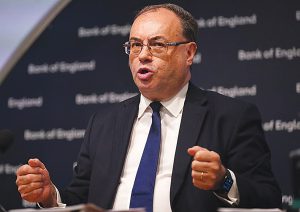The Bank of England’s next scheduled monetary policy gathering on Nov. 3 is a long, long way away. With the pound dropping to a record low against the dollar this week and UK borrowing costs surging, market soothsayers have called for an inter-meeting intervention. But Governor Andrew Bailey has resisted that temptation — and he’s right not to fall into the trap traders are setting for him.
On Friday, the government revealed the biggest suite of tax breaks in half a century, and Chancellor of the Exchequer Kwasi Kwarteng promised “more to come.†That fiscal giveaway, combined with energy-bill compensation for households and businesses that will cost £60 billion ($64 billion) in the next six months alone, has rattled sterling markets, with the pound bearing the brunt of investor unease.
So speculation about how the BOE would react mounted on Monday. Futures markets began to anticipate an emergency rate increase in the coming weeks. The prospect of verbal intervention to prop up sterling helped the pound recoup its losses against the greenback.
“If I were still at the BOE, I would be tempted to announce an extra meeting in a week,†Sushil Wadhwani, who was a UK ratesetter until 2002 before setting up his quantitative hedge fund PGIM Wadhwani, said on Monday. “The argument for waiting a week would be to give them time to properly assess the extra news. The reason for not waiting until November is that they are cognizant of the need to respond in a timely basis to the new developments.â€
In the end, a statement from Bailey came late Monday, saying the central bank would make a “full assessment at its next scheduled meeting†on the impact of the UK government’s fiscal plans and the fall in sterling, and “act accordingly.â€
—Bloomberg
 The Gulf Time Newspaper One of the finest business newspapers in the UAE brought to you by our professional writers and editors.
The Gulf Time Newspaper One of the finest business newspapers in the UAE brought to you by our professional writers and editors.
